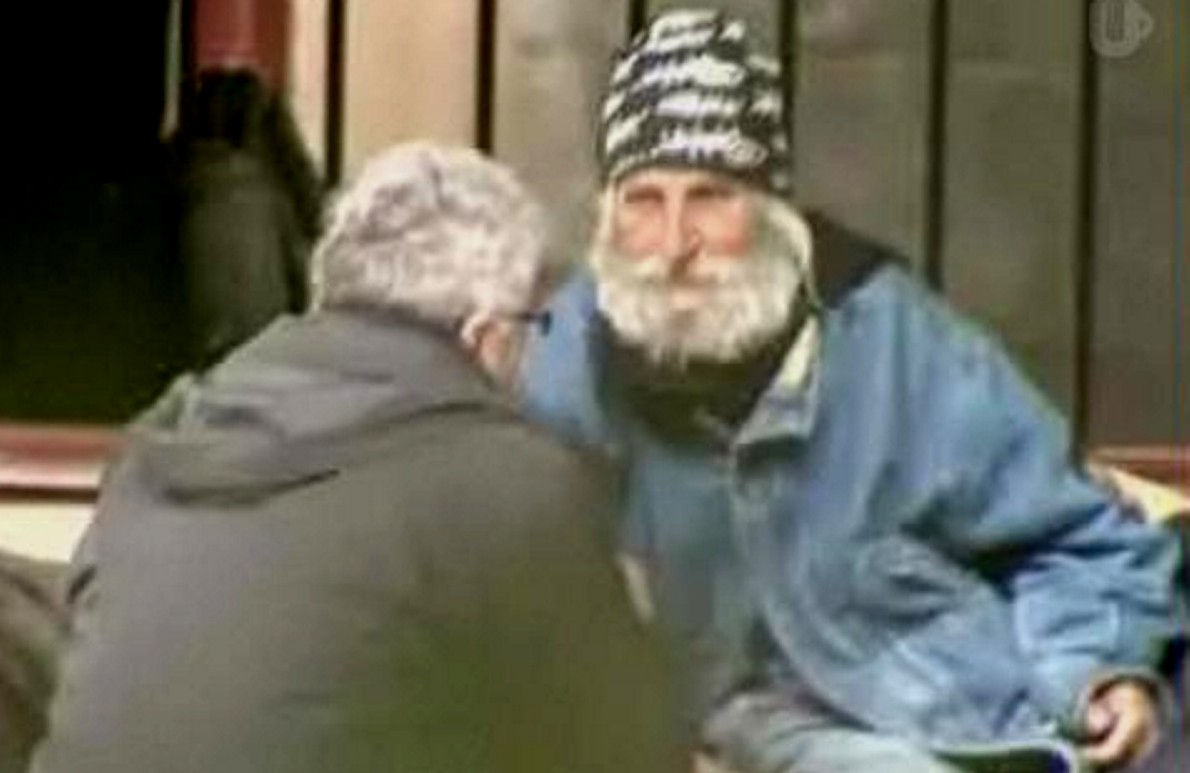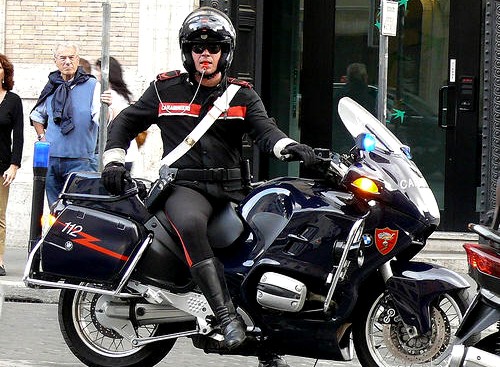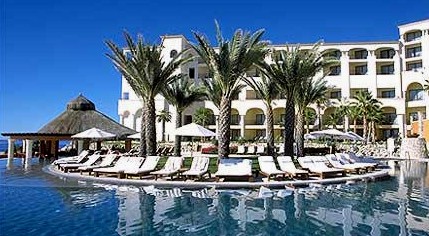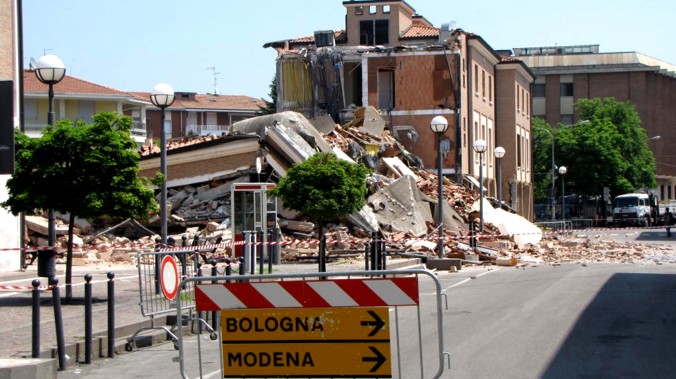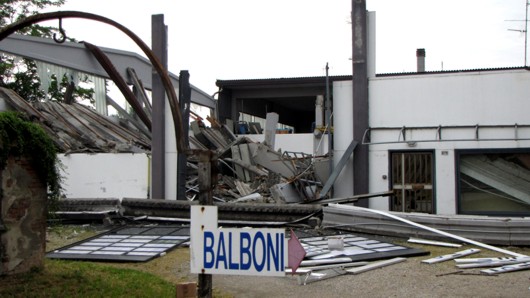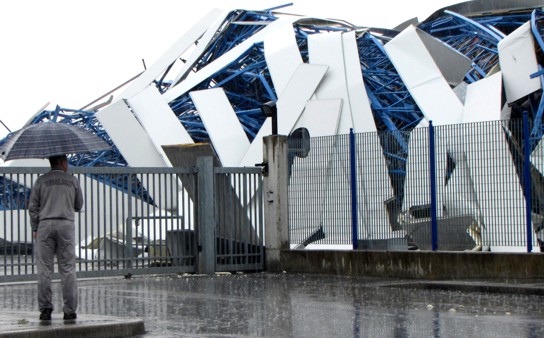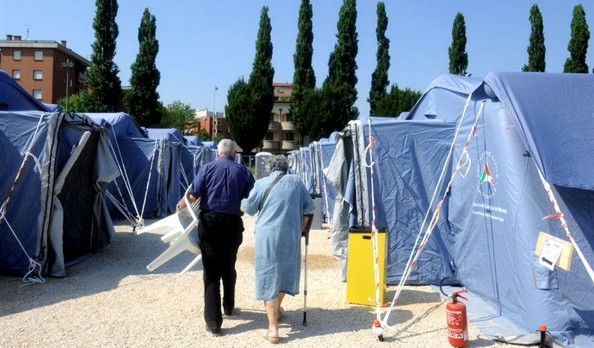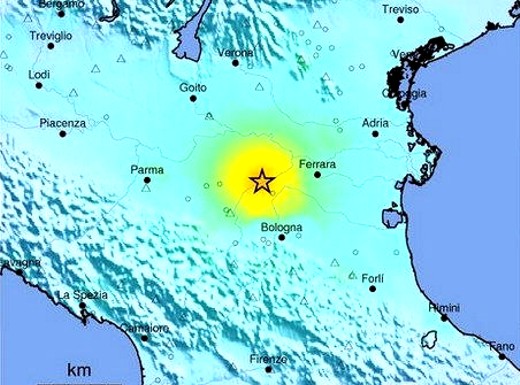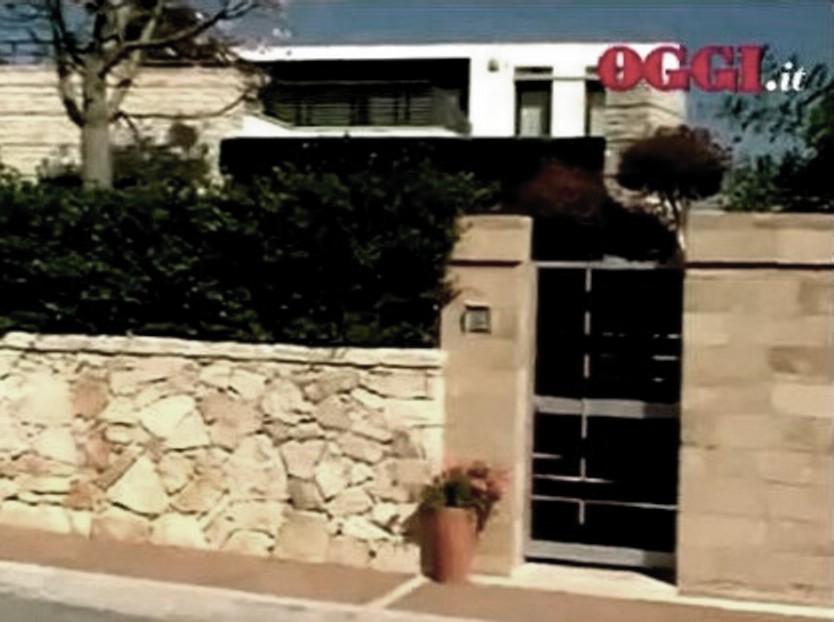
Category: The wider contexts
Thursday, August 30, 2012
Seems A Sudden U-Turn For The Better In The German-Italian Economic Relationship
Posted by Peter Quennell
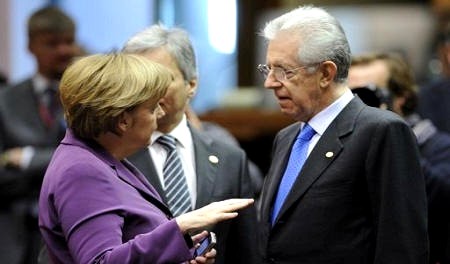
This has been a tense time for both leaders. Just a few days ago nasty words were surfacing in the media on both sides.
But quite suddenly things are looking up. Ms Merkel praises Mr Monti and Italy just got the best price for its bonds since March.
Still the deep insecurities persist. Hard to see such a fine people so down.
Tuesday, August 14, 2012
Giuseppe Castellini Speaks Up For A “Kind Homeless Man Of Many Aspects”
Posted by Jools
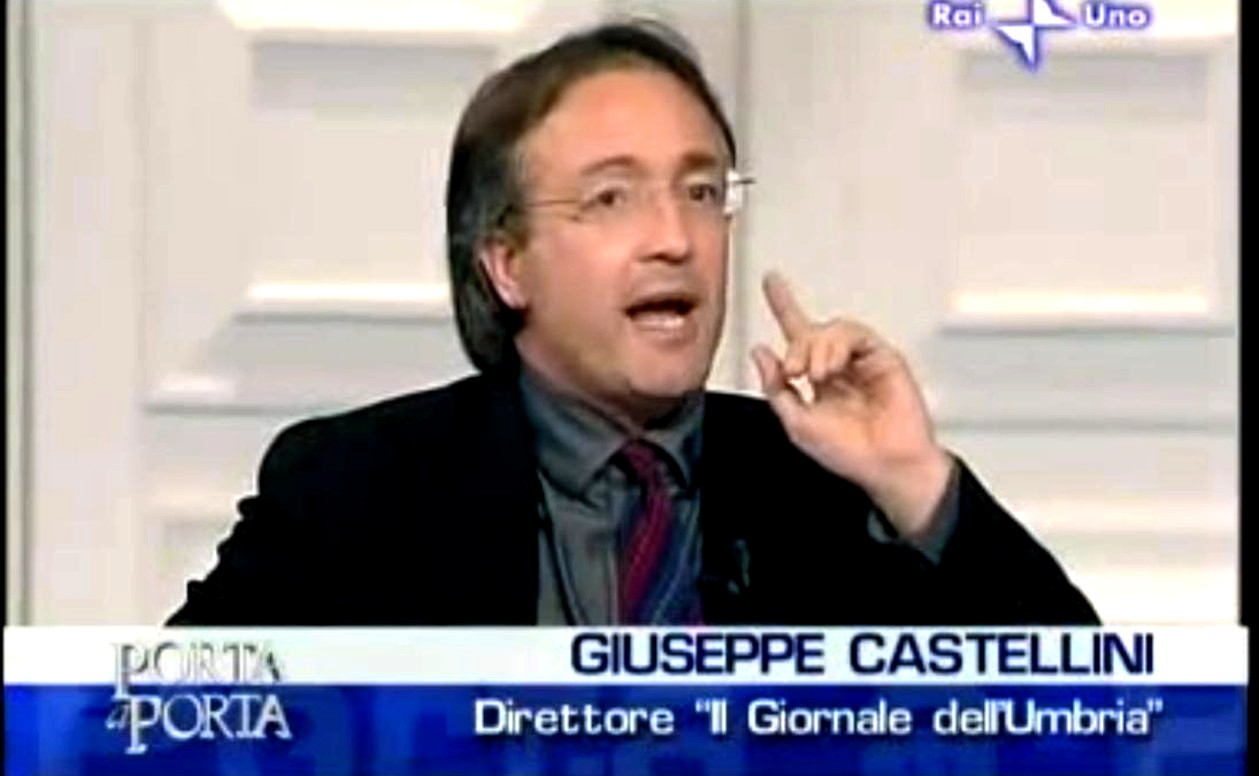
Giuseppe Castellini (above) is the editor of the Journal of Umbria in Perugia. Throughout the case he and his various reporters have done amazing, fearless work.
Today he writes movingly about the sad passing in prison of the honest and brave free spirit Antonio Curatolo, who had been charged during the appeal on a minor eight-year-old charge, apparently at someone’s insistence.
Our lives crossed on the path of the tragic murder of Meredith Kercher. And, somehow, we were no longer separated. Even though, rather than crossing paths, in time they’ve run parallel courses. Up to Friday, when death took him away, at the age of 56. And in his passing we (I speak in the plural because the same sentiment is felt by Francesca Bene, Luca Fiorucci and Antioco Fois, the colleagues who have been following the Meredith case and who met him), we feel deeply saddened.
Antonio Curatolo was no saint. But he had his candour, his naturalness, his humanity and his inner rectitude. Sometimes, I felt he was perhaps dissociated. The homeless romantic and anarchic that reads a lot and has a self-taught culture, living on the edge of society by choice, but who “struggles along” not always in a limpid way. A stray cat, clever and naïve at the same time. Tough and kind, profoundly honest, and at the same time illicit.
I remember when we were informed that a homeless man told someone (who then informed us) that he had seen on the night of the murder Amanda and Sollecito in the Piazza Grimana in Perugia, when as usual he was reading while sitting on a bench in the piazza. The story is well known: Amanda and Sollecito are at the edge of the basketball court, and Raffaele sometimes gets up and leans over the guard rail.
An important testimony, because they had said they were asleep at that time. I remember the contact, the meeting, making him repeat continuously until he was exhausted, what he had seen. Trying to make him contradict himself, to see if what he was saying was true.
A good relationship was born in those days. We spoke about other things apart from the Meredith case, things in general. We got to know each other, we talked about our lives, so many things. And, eventually, it was not very difficult to convince him to tell the investigators what he had told us.
Even though we had to insist (with him, but also with the other witnesses that we found) on surpassing that anti-State Italian mentality in which everyone goes about his business, and that if you rather trust the State you’ll end up in trouble. He testified, and since his testimony was very important (he was defined by the media, with a bit of exaggeration, the “super-witness”), he was “grilled” very thoroughly.
But he essentially repeated the same story. So much so that the defence teams of Amanda and Raffaele, in the end they stirred in the direction of Curatolo maybe having seen the two youngsters, but not on the night of the murder. His version fully convinced the GUP Judge Micheli (who pointed out that no one could dare question his story because of the mere fact that Antonio had chosen an unusual way of life) and also convinced the judges of the First Instance trial.
Not those judges of the appeal, though, according to whom all the witnesses - especially if found by journalists ““ were either mythomaniacs, or were prompted to exaggerate by the suppose desire at all costs for a journalistic scoop by reporters (showing, if I may say so myself, a strong cultural retardation of the judges and a very provincial point of view - far from the reality ““ toward the print press and, more generally, media).
Antonio, as mentioned, was not a saint. His relationship with drugs not only bears witness to his admission that he was a heroin addict, but also the legal troubles related to possession of drugs with intent to sell. An accumulation of small penalties that brought him under house arrest and in prison. Although he proclaimed his innocence. The last time I saw him, some months ago, was when I met him in the street and I accompanied him to the small flat he had rented in Corso Cavour. To complete the house arrest penalty, he told me.
But seeing him enter into that small apartment, after seeing him in the cardboard houses that he was building here and there, gave me the sad impression of a little bird entering a birdcage.
In short, I loved him, despite some aspects of his life. When I saw him we smiled. And they were smiles of men sincere with each other. I had affection for him. His sins, I’m sure, have been forgiven.
May the earth of the grave rest lightly on you, Antonio.
Tuesday, July 31, 2012
In Terms Of Medals Won Per Population Per Capita Italy Is Right Now Coming First At Olympics
Posted by Peter Quennell
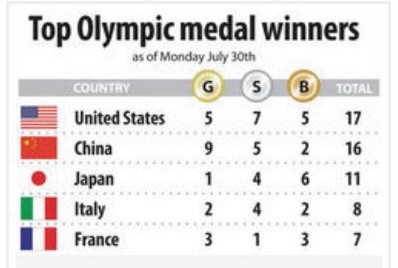
The two frontrunner countries - the US and China - have overall each won about twice Italy’s current tally of medals.
Japan also has won several more. However, Japan’s population is more than twice the size of Italy’s, the US’s population is more than 5 times, and China’s population is more than 15 times.
Some 27 countries have so far won medals, out of 204 countries competing.
Right now Italy is ahead of France, South Korea, Russia, North Korea, Australia, Britain (host country), Romania, Brazil, Hungary, Ukraine, Kazakhstan, Germany, and the Netherlands.
Rankings do change almost daily, but Italian athletes are off to a pretty nice start.
Tuesday, June 26, 2012
Italian Police Long Known As Among Europe’s Coolest, Now Also Being Remarked Upon As…
Posted by Peter Quennell
It’s tough right now for Italian cops, going up against the rioting crowds and the illegal immigrants and the three mafias. But with their sustained pressure the mafias are fading, and the riots and immigrants may dwindle soon if and when light appears at the end of the economic tunnel.
And those images are not what Italian police are best known for.
Above all else, they are cool. They officially work hard at being cool and high-profile and rather colorful, which is perhaps one reason why the Italian prison population is so very low. Their regular uniforms and their ceremonial uniforms tend to be eye-catching, and sometimes resplendent, and unless you’re Mr Berlusconi, their manner tends toward firm but agreeable, and sometimes quite funny. .
One can be doing 100 mph on an autostrada and a car will come by at 140 mph, with a police car on its tail which can exceed 200 mph. The second to last image below (above the… enough said) is of a Bugatti Veyron, which even in standard mode is powered by an engine of 1000 horsepower and has been clocked at close to 250 mph. (It also costs close to $2 million to private buyers.)
Now here is a report by John Hopper in the UK Guardian on the Italian police’s frequent warm side, and there are similar tales about the polizei on quite a few English-language and Italian blogs.
The financial crisis in Europe may have brought out the worst in certain bankers, but it seems to be bringing out the best in Italy’s police.
On Tuesday, and for the second time in less than a month, officers called to deal with a shoplifter were reported to have taken pity on the alleged thief and paid for the goods out of their own pockets.
The latest case arose when staff at a supermarket on the outskirts of Siena, in Tuscany, alerted police to a suspected robbery. The officers found a 27-year-old Egyptian and his 19-year-old brother who had apparently failed to pay for goods they had removed from the shop.
The police established that the older of the two was unemployed and had a wife and two children. Along with some pasta, he and his brother were found to have taken only milk, nappies and baby food. At this point, according to Corriere Fiorentino, the officers opened their wallets and paid the bill.
A similar gesture prompted a round of applause from shoppers at a supermarket in Milan after a 76-year-old pensioner, identified only as Angela, was found to have passed through the checkout without paying for a box of Tic Tac sweets worth 60p.
Sergeant Arturo Scungio said he and his patrol partner had caught up with the suspect near the shop. “She was trembling like a leaf and was clearly frightened by the uniform. From the way she was dressed, I realised she was not well off, that she was one of those who have difficulty making it to the end of the month. I told her what the law was and then I asked her how much pension she received.”
The old lady said that she was on €320 (£255) a month, adding: “I’ve always paid my taxes.” Scungio said that by the time they returned to the supermarket checkout, she was in tears.
The manager told them he did not intend to press charges. “I opened my wallet and paid the 78 cents owed for the Tic Tacs,” Scungio said.
Those humorless sad sacks who have attached themselves to Amanda Knox like leeches… Pity they’re so blinded to Italy’s rather cool reality.
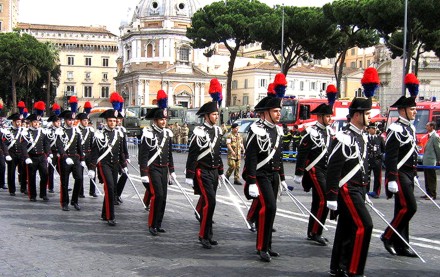



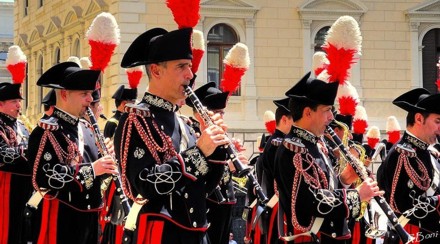

Wednesday, June 20, 2012
With Italy Pushing, There Are Increasing Bets On Europe Settling On A Growth Plan B
Posted by Peter Quennell
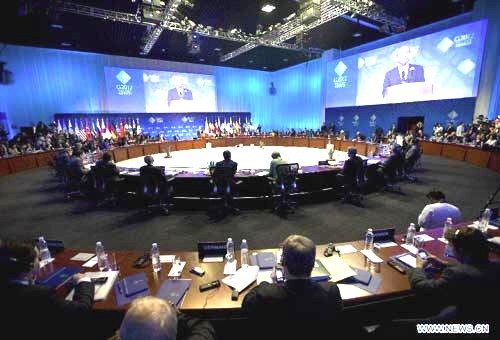
[Above and below: the G20 meeting in Baja California and the Los Cabos resort]
At the G20 Summit now taking place on the Baja Peninsula Italy and France have just strongly pushed for the creation of Euro-bonds.
The rates for such bonds to be secured mostly by gold (mostly on deposit in the Federal Reserve Bank in New York - where a lot of Europe’s troubles began!) would reflect investors’ perceptions of the growth potential of all of Europe, not just Greece or Spain or Italy or Portugal or Ireland by themselves.
A cheaper cost of capital across Europe would help to make the value equations start to come right. Far better than Germany’s imposed Plan A which is essentially austerity during a recession and nothing else.
In contrast the German economy is actually doing very nicely right now, with high growth and low unemployment and strong exports and huge swathes of capital moving into its rather strapped banks from the countries further south. Other things being equal, Germany could live with a “half pregnant” situation for quite a while.
But thankfully, there are two dark clouds on Germany’s horizon which may cause it to end its power trip.
First, Greece and Spain and Italy could all vote in radical-left governments within a year if austerity remains the entire mix. And second, the entire world could move into recession or even depression and then Germany would slow down along with everybody else.
Germany could do everyone a lot of good if it stopped the moralising and instead shared with all the other countries how its own extended growth came about.
It is worth reading the Wikipedia entry for Germany’s history of growth. Two post WWII concepts made a huge difference and still do. Here they are in bold.
The Germans proudly label their economy a “soziale Marktwirtschaft,” or “social market economy,” to show that the system as it has developed after World War II has both a material and a social””or human””dimension. They stress the importance of the term “market” because after the Nazi experience they wanted an economy free of state intervention and domination. The only state role in the new West German economy was to protect the competitive environment from monopolistic or oligopolistic tendencies””including its own.
The term “social” is stressed because West Germans wanted an economy that would not only help the wealthy but also care for the workers and others who might not prove able to cope with the strenuous competitive demands of a market economy. The term “social” was chosen rather than “socialist” to distinguish their system from those in which the state claimed the right to direct the economy or to intervene in it.
Beyond these principles of the social market economy, but linked to it, comes a more traditional German concept, that of Ordnung, which can be directly translated to mean order but which really means an economy, society, and policy that are structured but not dictatorial. The founders of the social market economy insisted that Denken in Ordnungen””to think in terms of systems of order””was essential. They also spoke of Ordo-Liberalismus because the essence of the concept is that this must be a freely chosen order, not a command order.
This is in many ways the opposite of the tunnel-vision Washington Consensus which the IMF and World Bank and United States for far too long wrongly imposed on the world - and of which Euro-austerity is its devil spawn.
You can find a similar philosophy to Germany’s in Japan with the Keiretsu which saw it rocket up in the 60s and 70s, and which was picked up by the Little Dragons and China and finally all the middle-tier economies seeing recent strong growth.
Europe needs to further shore up and educate its manpower. That is a no-brainer. But its major growth breakout will only come if it tweaks and reinvents its millions of technical and managerial systems, just as Germany does. And if it demonstrates a very sharp nose for future value - as in fact Italy’s nimble entreprenuers already do.
It’s smart systems to create high value that you need, guys. Don’t let the over-intrusive and not-very-enlightened economists and central bankers and politicians tell you different.
Wednesday, June 13, 2012
Today And Tomorrow Are Really Key Days For The Italian Economy If Future Sums Are To Work
Posted by Peter Quennell
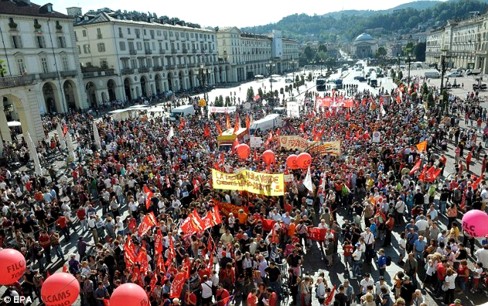
[Above: a demonstration against austerity, in Turin, one of several hundred in recent days]
The Italy central bank is selling a lot of bonds today and tomorrow to keep the government in business.
Today’s sale of 12-month bonds did not go well. It sold E6.5 billion of bonds at nearly 4 percent, almost double what it was charged just last month. And tomorrow’s sale of long-term bonds could be looking at interest rates so high that it puts real growth almost permanently out of reach.
In effect it could bake in youth unemployment up to 25 percent. The good news, if there is any, is that the disappointing sale today gave Prime Minister Monti a reason to light a fire under the parliament.
talian Premier Mario Monti is urging lawmakers to accelerate passage of reforms to help the country escape the deepening debt crisis and assure international markets that the eurozone’s third largest economy will follow words with actions.
Monti addressed the lower house before a vote on anti-corruption measures, and the morning after meeting leaders of three main political forces to urge them to intensify the reform course.
Spain’s decision over the weekend to seek a bailout for its banks has heightened pressure on Italy. The Austrian finance minister suggested this week that Italy too will need a bailout, then backtracked under criticism.
Monti has firmly denied that Italy will need a bailout, and told lawmakers that Italy is on much better footing than a few months ago.
One thing going for Italy is that those bonds are largely purchased by Italians themselves. Savings have been flying out of Greece and Spain but Italians still seem optimistic at some level that their economy can get back to former heights
Mr Monti’s pruning and tightening of laws don’t seem a bad thing. His main growth-thrust idea for all of Europe, Italy included, is to press the pedal to the floor on rebuilding all the physical infrastructure. Angela Merkel might come around if that doesnt tank Germany’s own boom.
The notion that there should be a sort of skeleton Department of the Treasury or Ministry of Finance in Brussels to harmonize fiscal policies and oversee the banks seems to be taking hold.
Still only dim comprehension (as in the US) though of how the best kind of growth really works. Hint: economists and bankers are not the first professions one turns to, to find out all about that.
Saturday, June 02, 2012
Andrea Vogt Reports First-Hand On The Earthquakes That Have Hit Italy’s Economic Epicenter
Posted by Peter Quennell
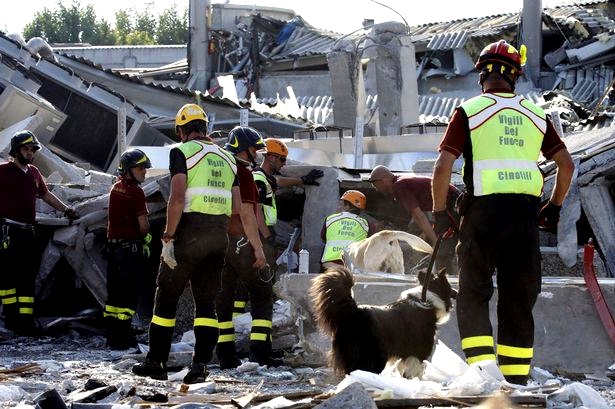
[Images here are by Andrea Vogt and one each Getty Images and NBC.]
Italy’s previous large earthquake in 2009 resulted in 308 deaths around L’Aquila.
A lot of the extensive damage to that town occurred because L’Aquila is an old city (one hour south-east of Perugia) which had not yet been braced or modernised to withstand severe earthquakes.
The two quakes that hit the province of Modena (map at bottom) in the past two weeks resulted in less than two dozen deaths, but in all other respects their damage has been far greater. They were more severe on the Richter scale than the L’Aquila earthquake and tremors were felt all over northern Italy and up into Austria.
And they struck right in Italy’s economic-exports heartland.
Car-makes Maserati, Ferrari and Lamborghini and the mortorcycle maker Ducati are all based right there and all of their plants temporarily had to shut down. Maserati and Ferrari are now owned by FIAT (majority owner of the US’s Dodge-Chrysler) which also saw other assembly plants hit.
Modena also produces cheeses which are heavily exported, and not far away are the plants of the exporters of textile, leather and jewelery fashion goods, of ceramics, of foods other than cheeses, and of Italian wines.
On-the-spot reports by Andrea Vogt with more close-up human detail than most others have appeared on a number of media websites. Excerpts from the report Andrea Vogt filed with Tom Kington which appeared on the Guardian website:
The Italian government said 8,000 people were left homeless, adding to the 6,000 already sleeping in tents and temporary accommodation after the first, 6.0-magnitude quake, which struck the same area in the early hours and killed seven.
The latest quake occurred at 9am when more factories were open ““ causing the higher death toll…. Some of the victims died in factories that had just reopened after suffering damage in the earlier quake.
“I saw dust and smoke coming up from the factories and warehouses on the edge of town,” said Cavezzo resident Maurizio Bruschi. “Many told themselves that the worst was over. But we keep getting hammered.”,,,
The quakes are a serious blow for one of Italy’s most productive regions, just as the country struggles to lift itself out of recession. “Fear will paralyse Emilia now,” wrote Mario Calabresi, editor of the newspaper La Stampa. “Who’s going to be willing to go back to work in a big warehouse now?” he asked…
Convoys of fire brigades and ambulances clogged tiny roads east of Modena, many littered with downed electrical lines and fallen debris. In the tent cities instructions were written in Italian and Arabic for the benefit of migrants working in local factories.
Other residents set up tents in their gardens, or made plans to head to relatives or to the Adriatic coast, where some hotels were opening up rooms to evacuees.”
More below.
From the same report, a story of a priest who was one of those killed by the unexpected double whammy.
In Rovereto sul Secchia a priest, Father Ivan Martini, was killed by a falling beam when his church partially collapsed on him. He was visiting the church, which had been damaged in the earlier quake, to see if he could salvage a statue of the Madonna.
“He was brilliant, and very dedicated, especially to the inmates incarcerated in Modena, where he was the prison chaplain,” said fellow priest Father Carlo Truzzi.
Andrea Vogt also posted a more detailed day-by-day report on her blog the Freelance Desk after combing the stricken areas. Her description below is what happened to the collapsed ceramics plant you can see in the first image below. .
Just a few hundred meters away, workers and curious onlookers came to see what was left of the twisted blue steel of the Sant’ Agostino Ceramics plant. They stared, the silence broken only by the eery sound of ceramic tiles clanking down from high scaffolding into the knot of bent metal. Two workers, Nicola Cavicchi, 35, and Leonardo Ansaloni, 51, died under the rubble as they tried to escape.
When Italy looses, we all really loose. Tough time to now have to pay for re-building.
Tuesday, May 29, 2012
A Second Earthquake Hits Italy One Week Later With Reported 17 Dead
Posted by Peter Quennell
Thursday, March 29, 2012
Why Didn’t Giulia Bongiorno Fight A Lot Harder - For Meredith Kercher, The Real Victim Here?
Posted by Peter Quennell
1. Bongiono as proponent for female victims
Sollecito lead lawyer and parliamentarian Giulia Bongiorno is persistently prominent in the Italian news.
Here she is captured by paparrazi while walking her baby son Ian around Rome. She is also in the news a lot for her political activities as a former senior member of the party of Silvio Berlusconi and possible future mayor of Palermo Sicily.
And she is fighting hard in court and the media for the interests of the passengers who were on the wrecked cruise ship Costa Concordia, and for the families whose loved ones died.
She also runs a group called Double Defense with Italian-speaking Swiss supermodel Michelle Hunziker (images of both above). Michelle just got engaged to the Italian fashion heir Tomaso Trussardi so she also is a lot in the news.
To raise funds for Double Defense they just co-hosted a glittering gala event in Milan. Many of Italy’s richest and most famous attended. Lots of money was raised.
So what is Double Defense?
Giulia Bongiorno and Michelle Hunziker founded Double Defense specifically to tilt the law and the courts more toward women who are the victims of violent crime. As Barbie Nadeau reports, that is much needed in Italy right now.
This description of Double Defense is from the Italian website Beautiful World.
Double Defense aims to help women who have suffered and are suffering domestic violence, physical or psychological, through assistance in the interpretation of the rules and regulations in force.
In addition to that the non-profit organization, born from a chance encounter between the Swiss showgirl and Bongiorno the lawyer, wants to raise awareness of this terrible phenomenon, promote a culture of nonviolence, and prevent passive acceptance and silence from being the only refuge of those who suffer such terrible and barbaric mistreatment.
There are many names known and loved who have decided to put their fame at the service of Double Defense. Anna Tatangelo, Federica Pellegrini, Francesco Totti, Nek, Ilary Blasi and Silvia Toffanin are some of the celebrities who support the non-profit organization which was created by the duo of Hunziker and Bongiorno. .
The Foundation has a new partnership with the Italian brand Pandorine. Co-promotion will include a new marathon and relay race in Piazza Castello, and a special type of bag that is symbolically called Women: completely white, perfect for summer, and bearing a meaningful and touching inscription…
2. Female victim here be damned
We wonder. Did it never occur to Giulia Bongiorno that one of the most prominent women victims in many years was in fact Meredith Kercher? A victim of a cruel and gratuitous murder? Seemingly the MOST deserving victim for Bongiorno to wage a fight for?
Maybe the answer was yes - back at trial in 2009.
Sollecito’s father seemed to have wanted to retain Ms Bongiorno because of her political clout, from wiretap mentions made public which seem to show zero belief in Sollecito’s innocence. Ms Bongiorno often seemed disinterested at trial, and even disappeared or failed to show once or twice.
She seemed from photos in court to have poor chemistry with Raffaele Sollecito, and we heard that both she and Luciano Ghirga were so disbelieving in the innocence of their clients and so irritated at the PR that they might walk and leave Knox and Sollecito to find new defense counsel.
But in 2011 we saw something entirely different.
During the first appeal under Judge Hellman, Ms Bongiorno seemed to have other things on her mind than the truth of her client’s guilt or innocence, or the fact that the victim in this case, was a super-achieving woman. Meredith’s family being in another country, with few resources of their own, helped to enable an arrogant callousness.
She presumably could have used a win right about then against the justice system of Italy, in support of the beleagured PM Berlusconi, and she may have had (and still have) on her mind that run for the office of mayor in Palermo, Sicily.
Who knows what else might have been on her mind? But in 2011 she certainly mounted a scorched-earth, take-no-prisoners defense of Raffaele Sollecito, and the female victim Meredith be damned..
Bongiorno introduced the bizarre witnesses Alessi and Aviello to discredit Rudy Guede, and one of them (Aviello) openly claimed that he had committed perjury because bribes were being offered in his prison in exchange for testimony helpful to Sollecito. (That is still being investigated.)
Ms Bongiorno also went to remarkable lengths, with witness after witness after witness, to discredit Antonio Curatolo, the claimed observer of Knox and Sollecito in the park. Impartial lawyers think that Curatolo did still emerge as having seen something on the correct night, but he was now openly tarred as a heroin dealer, and in his report Judge Hellman displayed suspicion towards all of the witnesses.
Ms Bongiorno’s performances at trial and at appeal were like night and day.
3. Bongiorno as contemptible hypocrite
So two people who Ms Bongiorno may have always disbelieved and had little time and respect for presently walk free. While the precise kind of victim Bongiono now claims to go to bat for is simply shrugged off, with absolutely no sign of her caring.
Obviously not all women victims in her eyes are equal. Winning at all costs no matter the hurt is what she is really about.
Wednesday, March 14, 2012
Rome Appeal Court Rejects Vanessa Sollecito’s Appeal For Reinstatement In The Carabinieri
Posted by Peter Quennell

[Above and below: Francesco, father of Vanessa and Raffaele, outside their Bisceglie family home late 2011]
In 2008 Vanessa Sollecito and her father Francesco were caught on tape discussing the manipulation of Rome politicians into forcing changes upon the investigation team in Perugia.
Vanessa was fired from the Carabinieri the prestigious Italian national civil-military police force in November 2009 for demonstrating behavior and psychology inappropriate to a law enforcement officer’s job.
Our Italian poster ncountriside has just alerted us to the posting of the official statement that her appeal has been turned down.
The European Court is quoted in that report as confirming that national members have the right to fire official staff for psychological and behavioral cause.
The Carabinieri carried out a very thorough investigation which included the secret bugging of her mobile phone and her father’s phone. Jools translated one key conversation here. Her father suspects they are being bugged by the police but she blithely talks on, digging them in deeper.
This ruling was probably posted when Vanessa Sollecito was already in the air bound for Seattle (see the post below) but she would have known it was coming. This does not bode well for the criminal trial she faces along with her close family, possibly starting in Bari at the end of this month. The charges could incur prison terms.
The Sollecito family arc has almost never been reported on in the English language press. In 21 June 2008 Tom Kington of the Guardian did file this brief report.
The investigation into the murder of British student Meredith Kercher in Italy took a dramatic twist yesterday when the family of one of the suspects was accused of attempting to interfere with the inquiry.
Police tapping the phones of the father of Italian student Raffaele Sollecito overheard discussions that appeared to suggest plans being made to get senior politicians to use their influence and get detectives whom the Sollecitos considered hostile taken off the case. The phone tap information is in files handed over to lawyers as magistrate Giuliano Mignini officially completed the investigation into the strangling and stabbing of Kercher, from Surrey, who was found on 2 November semi-naked in a pool of blood in her bedroom in Perugia.
‘We’ve got to flay the Perugia flying squad,’ a family member was overheard saying, according to the Italian newspaper Corriere della Sera. ‘If we can get rid of the head of homicide and that other one, we’ll be OK.’
Relatives of Sollecito, including his sister, a policewoman, were also overheard discussing politicians who could help their case. Giulia Buongiorno, a lawyer and MP in Silvio Berlusconi’s ruling coalition, has now been retained to represent Sollecito. ‘She can help out on this case at a political level,’ Sollecito’s father was overheard saying.
Sollecito’s father, Franco, a well-to-do doctor from Bari in southern Italy, has campaigned to prove his son’s innocence, even to the point of allegedly leaking to a TV station a video obtained from the crime scene showing Kercher’s corpse, as well as highlighting perceived errors by the investigators, including the delayed recovery of parts of Kercher’s bra strap which were found to carry Sollecito’s DNA.
Police are holding in custody Sollecito, 24; his former girlfriend and Kercher’s flatmate, American student Amanda Knox, 20; and a third suspect, Rudy Guede, 21. All three deny involvement in the vicious killing.
As you can see here, Italian reporting like that translated by Jools usually includes a lot more damning detail.

